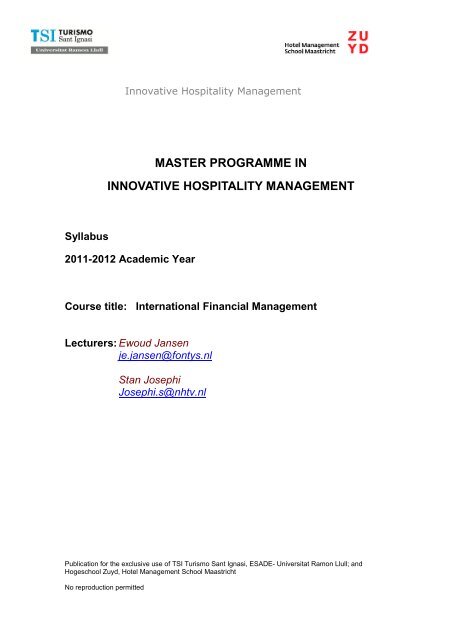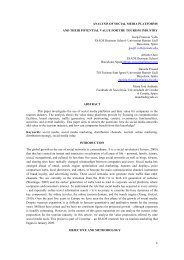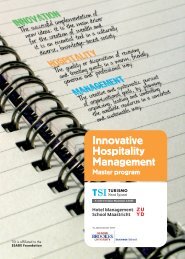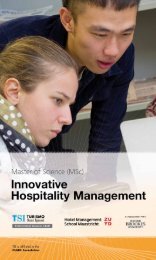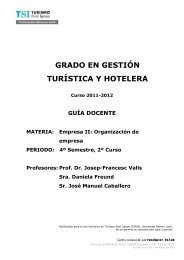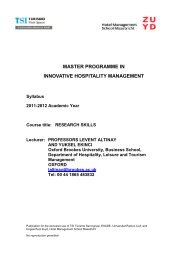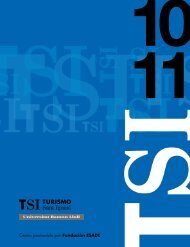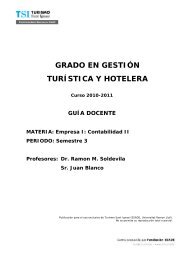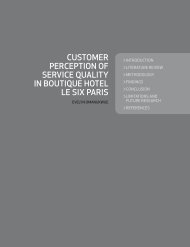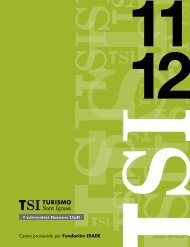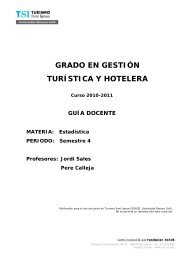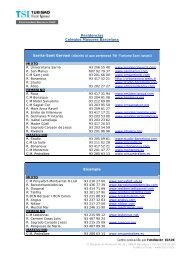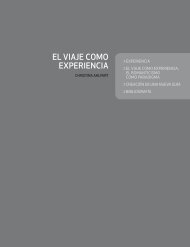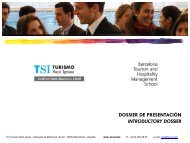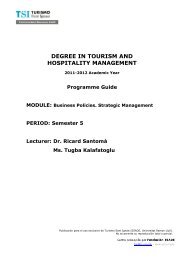International Financial Management - TSI-Turismo Sant Ignasi ...
International Financial Management - TSI-Turismo Sant Ignasi ...
International Financial Management - TSI-Turismo Sant Ignasi ...
Create successful ePaper yourself
Turn your PDF publications into a flip-book with our unique Google optimized e-Paper software.
Innovative Hospitality <strong>Management</strong><br />
MASTER PROGRAMME IN<br />
INNOVATIVE HOSPITALITY MANAGEMENT<br />
Syllabus<br />
2011-2012 Academic Year<br />
Course title: <strong>International</strong> <strong>Financial</strong> <strong>Management</strong><br />
Lecturers: Ewoud Jansen<br />
je.jansen@fontys.nl<br />
Stan Josephi<br />
Josephi.s@nhtv.nl<br />
Publication for the exclusive use of <strong>TSI</strong> <strong>Turismo</strong> <strong>Sant</strong> <strong>Ignasi</strong>, ESADE- Universitat Ramon Llull; and<br />
Hogeschool Zuyd, Hotel <strong>Management</strong> School Maastricht<br />
No reproduction permitted
Innovative Hospitality <strong>Management</strong><br />
MASTER PROGRAMME – COURSE SYLLABUS<br />
COURSE: <strong>International</strong> <strong>Financial</strong> <strong>Management</strong><br />
CODE: M2 IFM<br />
COURSE TYPE: Compulsory YEAR: 2011- 2012<br />
ECS CREDITS: 5 ECTS<br />
BLOCK: Maastricht<br />
LECTURERS: Ewoud Jansen & Stan Josephi<br />
1. General description of the course.<br />
The course addresses two main areas of interest: Revenue <strong>Management</strong> (RM)<br />
and Finance & Accounting (FA). Key principles of each area will be discussed.<br />
The aim is to understand how these principles can be used in the planning and<br />
decision making processes of businesses in the hospitality industry.<br />
2. Competencies developed within the course (according.<br />
Type<br />
General<br />
Specific<br />
Basic<br />
CC6 Problem Solving<br />
CC8 Information <strong>Management</strong> & Research<br />
CC9 Analysis & Synthesis of Data<br />
SC10 <strong>Financial</strong> <strong>Management</strong><br />
Name/Code<br />
BC1 Demonstrate Knowledge & Understanding<br />
BC2 Apply Knowledge & Understanding and Problem Solving Abilities<br />
BC3 Integrate Knowledge, Handling Complexity & Formulate Judgements<br />
3. Content.<br />
In the FA sessions, the following topics will be covered:<br />
1. <strong>Financial</strong> Statements & <strong>Financial</strong> Planning<br />
2. Ratio Analysis<br />
3. Capital Budgeting Decisions<br />
4. Marginal & Break Even Analysis<br />
5. Budgeting & Analysis of Budget Variances
Innovative Hospitality <strong>Management</strong><br />
In the Revenue <strong>Management</strong> sessions, the process of revenue management will<br />
be covered:<br />
4. Course objectives.<br />
a) Related to competencies.<br />
The content of the course will enable to student to:<br />
<br />
<br />
<br />
<br />
select, analyze and interpret relevant management information<br />
use financial information to assist decision making<br />
understand the basic requirements to manage the internal organization in<br />
order to successfully implement revenue management<br />
identify possible obstacles for the implementation of revenue management<br />
and take decisions to overcome them<br />
b) Related to content.<br />
After successfully completing the module, students will be able to:<br />
<br />
<br />
<br />
<br />
define and indentify the products and or departments in the hospitality<br />
industry that are suitable for applying revenue management techniques,<br />
focusing on key components and concepts;<br />
explain how the process of a successful revenue management process<br />
works and apply the necessary to implement these steps in a hospitality<br />
organization;<br />
understand and calculate key performance indicators such as RevPAR and<br />
how they can be applied with an organization;<br />
explain the relevant measures of forecasting and apply them to real-life<br />
situations
Innovative Hospitality <strong>Management</strong><br />
<br />
<br />
<br />
<br />
<br />
<br />
<br />
<br />
select criteria that determine the optimum business mix for a hotel and<br />
apply capacity management<br />
advise hotels on effective pricing and distribution policies with the objective<br />
to improve bottom-line performance;<br />
take a holistic approach to revenue management with the aim of increasing<br />
overall profitability for the company, bringing together all revenue<br />
generating units of a hotel<br />
compose financial statements<br />
perform a financial ratio analysis<br />
apply capital budgeting techniques such as pay back period, accounting<br />
rate of return and net present value<br />
perform capacity management decisions using marginal analysis<br />
analyze budget variances<br />
5. Required readings<br />
Author/s (year) Jansen, E (2011)<br />
Title (pages)<br />
Accounting & Finance; a Basic Introduction<br />
Publisher. City. Eleven <strong>International</strong> Publishers, The Hague<br />
Comments Chapters 1 – 6, 8,10 & 13<br />
Author/s (year) Hayes, D.K., Miller, A.A. (2011)<br />
Title (pages)<br />
Revenue <strong>Management</strong> for the Hospitality Industry.<br />
Publisher. City. John Wiley & Sons, Inc. Hoboken, New Jersey:<br />
Comments Chapters 1, 2, 4 – 8 & 12<br />
Author/s (year) Various articles that will be provided at the start<br />
of the course (complete list at point 11)<br />
Title (pages)<br />
Publisher. City.<br />
Comments<br />
Author/s (year) Jansen, E<br />
Title (pages)<br />
Finance & Accounting for Hospitality Industry<br />
Publisher. City. NA<br />
Comments<br />
Assignments & Case Studies<br />
Author/s (year)<br />
Title (pages)<br />
Publisher. City.<br />
Comments<br />
Total number of pages/ 450 pages, 105 hrs.<br />
estimated hours
Innovative Hospitality <strong>Management</strong><br />
6. Exercises and assessments<br />
Type Title Extension Dates<br />
Individual Ratio Analysis Annual report March 30<br />
Assignment<br />
2012<br />
7. Methodology and sessions chart.<br />
Finance & Accounting<br />
Session Content Methodology Output<br />
1 <strong>Financial</strong> Statements Lecture, discussion, Worked Solutions<br />
<strong>Financial</strong> Planning In-class assignments<br />
2 Ratio Analysis Lecture, discussion, Worked Solutions<br />
In-class assignments<br />
3 Capital Budgeting Lecture, discussion, Worked Solutions<br />
Cash Flow<br />
Projections<br />
In-class assignments<br />
Capital Budgeting<br />
Techniques<br />
4 Break Even Analysis Lecture, discussion, Worked Solutions<br />
Marginal Analysis In-class assignments<br />
5 Budgets<br />
Analysis of Variances<br />
Lecture, discussion,<br />
In-class assignments<br />
Worked Solutions
Innovative Hospitality <strong>Management</strong><br />
Revenue <strong>Management</strong><br />
Session Content Methodology Output<br />
1 Essentials of revenue<br />
management<br />
Lecture, discussion,<br />
In-class assignments<br />
Slides for the<br />
exam<br />
KPI’s for revenue<br />
management<br />
2 Forecasting<br />
Lecture, discussion, Slides for the<br />
Capacity<br />
In-class assignments exam<br />
management<br />
3 Pricing and<br />
restrictions<br />
Lecture, discussion,<br />
In-class assignments<br />
Slides for the<br />
exam<br />
Distribution of hotel<br />
inventory<br />
4 Total Revenue<br />
management<br />
Lecture, discussion,<br />
In-class assignments<br />
Slides for the<br />
exam<br />
The future of RM<br />
Group displacement In-class assignment<br />
calculation<br />
Working with<br />
restrictions<br />
In-class assignment<br />
Q&A<br />
8. Learning activities and distribution of work load (in student work<br />
hours). 1 ECS = 30 hours student workload.<br />
Workload distribution (RM) Hours (approx.)<br />
Lectures 12 hours (4*3)<br />
Reading and study<br />
50 hours<br />
Exam<br />
2 hours<br />
Total 64<br />
Workload distribution (F&A Hours (approx.)<br />
Lectures 15 hours (5*3)<br />
Individual Assignment 14<br />
Reading and study<br />
55 hours<br />
Exam<br />
2 hours<br />
Total 86
9. Evaluation procedure.<br />
Innovative Hospitality <strong>Management</strong><br />
Evaluation activity % on grade Assessed competencies<br />
Exam RM – 30 MPC<br />
50% All (see point 2)<br />
questions<br />
Exam F&A – 3 open<br />
questions<br />
Individual Assignment Ratio<br />
Analysis<br />
37.5%<br />
12.5%<br />
10. Lecturer (Short CV)<br />
Ewoud Jansen received his education and masters degree at Tilburg University,<br />
the Netherlands. In addition he attended summer courses at the North Texas<br />
State University in Denton Texas. Also he participated in workshops from visiting<br />
professors of the University of Dallas in Paris, France.<br />
He majored in Corporate Finance with a special interest in Mergers &<br />
Acquisitions. He is the author of Accounting & Finance; a Basic Introduction and<br />
also published on corporate governance and corporate social responsibility<br />
issues. Today he is a senior member of the academic staff of the <strong>International</strong><br />
Business and <strong>Management</strong> Studies program at Fontys University in Eindhoven. In<br />
this capacity he also gives guest lectures at partner universities in various<br />
countries. In addition he acts as a trainer and consultant in international programs<br />
and projects funded by organizations such as the EU, IMF and Worldbank.<br />
Stan Josephi is a full-time senior lecturer at the NHTV Breda University of<br />
Applied Sciences, where he is responsible for the Revenue <strong>Management</strong> program<br />
within the curriculum. Besides that, he is currently undertaking his Doctoral degree<br />
at the Maastricht School of <strong>Management</strong>, focusing essential features underlying<br />
the revenue management process. After completing his Hotel <strong>Management</strong><br />
education in Leeuwarden, he worked for numerous years in the international hotel<br />
industry in London, before switching to a consultancy role within revenue<br />
management. Within his position as researcher, he has published and presented<br />
articles on the challenges surrounding the education of revenue management, as<br />
well as the decision making process Dutch hotel operators use to make specific<br />
rates available.
11. Literature.<br />
Innovative Hospitality <strong>Management</strong><br />
Books<br />
Jansen, E. (2011), Accounting & Finance; a Basic Introduction.<br />
The Hague, Eleven <strong>International</strong> Publishers, ISBN 978-90-5931-628-7<br />
Hayes, D.K., Miller, A.A. (2011), Revenue <strong>Management</strong> for the Hospitality<br />
Industry. Hoboken, NJ: John Wiley & Sons, Inc., ISBN 978-0-470-39308-6<br />
Articles<br />
Burgess, C. & Varini, K., Optimizing the Future of Hospitality Businesses, Oxford<br />
Brookes University.<br />
Davenport, T. (2006), Competing on Analytics, Harvard Business Review January<br />
2006.<br />
Enz, C. (2009), Key Issues of Concern in the Lodging Industry: What Worries<br />
Managers, Cornell Hospitality Report Vol. 9 no 4.<br />
Gross, R., Higbie, J & Cross, D. (2009), Revenue <strong>Management</strong>’s Renaissance: A<br />
Rebirth of the Art and Science of Profitable Revenue Generation, Cornell<br />
Hospitality Quarterly.<br />
Kimes, S. (2011),<br />
The Future of Hotel Revenue <strong>Management</strong>, Journal of Revenue and Pricing<br />
<strong>Management</strong> Vol. 10 no 1.<br />
Noone, B., McGuire, K. & Rohlfs, K. (2011),<br />
Social Meets Hotel Revenue <strong>Management</strong>: Opportunities, Issues & Unanswered<br />
Questions, Journal of Revenue and Pricing <strong>Management</strong> Vol. 10 no 4.<br />
Palmer, A. & McMahon Beattie, U. (2008), Variable Pricing through Revenue<br />
<strong>Management</strong>: a Critical Evaluation of Affective Outcomes, <strong>Management</strong> Research<br />
News Vol. 31 no 3.<br />
Pinchuk, S. (2007), Should Revenue <strong>Management</strong> be Called Displacement<br />
Optimisation? Journal of Revenue and Pricing <strong>Management</strong> Vol. 6 no 4.<br />
Pinchuk, S. (2009), Changing Revenue <strong>Management</strong> and Marketing Using a New<br />
Customer Life Cycle System, Journal of Revenue and Pricing <strong>Management</strong> Vol. 8<br />
no 1.<br />
Vinod, B. (2004), Unlocking the Value of Revenue <strong>Management</strong> in the Hotel<br />
Industry, Journal of Revenue and Pricing <strong>Management</strong> Vol. 3 no 2.
Innovative Hospitality <strong>Management</strong><br />
Yeoman, I. (2011),<br />
Ten years of Revenue <strong>Management</strong>: Journal of Revenue and Pricing<br />
<strong>Management</strong> Vol. 10 no 1.<br />
12. Observations.<br />
Being actively involved with the materials, both in class and outside, is essential to<br />
understand and grasp the topics. An active and open minded mindset is expected<br />
of all participants. Students must bring literature and a calculator to class.


